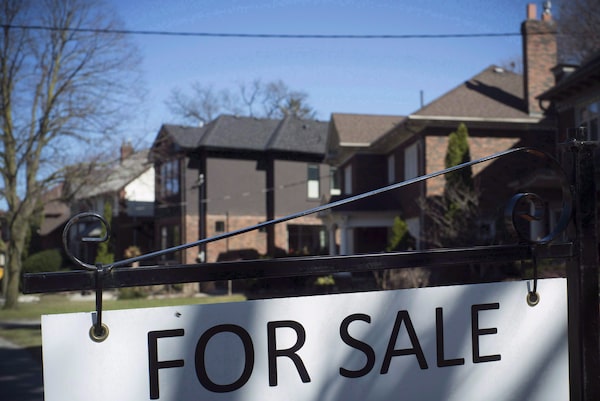
The Canadian Real Estate Association says home sales and prices fell in January.Graeme Roy/The Canadian Press
Canada’s housing downturn deepened further in January, with sales hitting their lowest level since the Great Recession and home prices declining for the 11th straight month.
The trajectory of the country’s housing market is unclear, with borrowing costs at their highest level in years and expectations rising that the Bank of Canada will no longer pause interest rate hikes after strong employment reports here and in the United States.
Most economists predict that home prices will continue to decline in the first half of the year as borrowers deal with the spike in mortgage rates. But the real-estate industry is reporting that would-be buyers are trickling back into the market.
Nevertheless, last month’s volume of sales was the lowest level for January since 2009′s recession, according to the Canadian Real Estate Association. The number of sales in January was 3 per cent lower than December after removing seasonal influences. And the home price index, which excludes sales of highly priced properties, was $714,700 last month, down 1.9 per cent from December. The index is 12.6 per cent lower than a year ago and 15 per cent below last February’s peak values.
More homeowners put their properties on the market, with new listings increasing 3.3 per cent last month. CREA said this could be the start of more activity heading into spring, traditionally the busiest period for home sales “We may have to wait another month or two to see what buyers are planning this year,” said CREA chair Jill Oudil.
Since the Bank of Canada started hiking interest rates early last year, the country’s housing market has slowed significantly. Many homeowners and prospective buyers had been in a holding pattern as they looked for a sign that the market was stabilizing. Owners delayed putting their properties up for sale because they were waiting for prices to rebound, while would-be buyers waited for prices to drop further.
But since the central bank announced in January that it could take a break from rate hikes, mortgage brokers say there has been more action.
Canada needs to boost home building by 50 per cent to keep up with immigration, report says
What to do about housing affordability amid high interest rates
Chris Allard, an Ottawa-based mortgage broker, said more borrowers are looking to get preapproved for a mortgage after putting buying plans on hold last year. Some of his clients have “reworked their budget and readjusted the price point they are willing to buy,” he added.
Sadiq Boodoo, a mortgage broker in the Toronto region, said that he has also seen a slight increase in borrowers seeking preapproval, but that it is still nowhere near normal market volumes. Would-be borrowers were spooked last year, he said, as they often saw their preapproved mortgage rates disappear when the Bank of Canada raised interest rates. (Over the past 11 months, the central bank has increased interest rates eight times. The overnight rate is now 4.5 per cent compared with 0.25 per cent a year ago.)
Another interest rate hike would likely curb any activity.
The CREA report said that home prices are starting to increase in parts of Atlantic Canada. But large areas of Ontario and B.C. continue to see declines, particularly in places that had experienced the greatest price increases.
In the Chilliwack region in B.C., for example, the home price index fell 3 per cent last month and is down 22 per cent year-over-year. In Kitchener-Waterloo and London in Ontario, the price index has declined by similar percentages over the same periods.
In the Toronto region, the country’s largest real-estate market, the price index dropped 2.2 per cent last month and has decreased by 9.6 per cent year-over-year. In the greater Vancouver area, the typical home price is 1.2 per cent lower on the month and 6.6 per cent lower over the past 12 months.